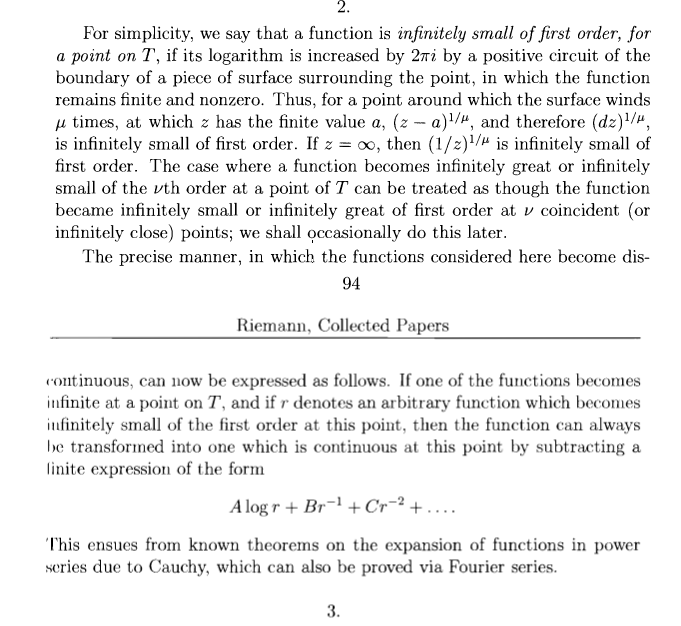In Riemann's publication about Abelian functions 'Theorie der Abelschen Functionen' (Here the original paper in german) at the end of Chapter 4, part 2 is clamed that for every Riemann surface $T$ and $ a \in T$ every meromorphic multivalued (?) function $f: T \to \hat{\mathbb{C}}$ with $f(a)= \infty$ can be locally expanded via
$$g + A \cdot \log \ r +B r^{-1}+ C r^{-2}+ \ldots $$
where $g$ is finite & continuous in $a$ (so 'nice' enough), the values $A, B, C,\ldots$ are appropriate complex coefficients and the function $r: T \to \mathbb{C}$ is the so called infinitely small function of first order. In modern language of complex analysis this $r$ is nothing but the local parameter in $a$, that is locally near a point $a \in T$ the function $r$ behaves like $z$ near $0$ on the plane $\mathbb{C}$. So for sake of simplicity say $T= \mathbb{C}$ and $f: \mathbb{C} \to \hat{\mathbb{C}}$ is multivalued with $f(0)= \infty$.
Why locally $f$ can be always writen as
$$ g(z) + A \cdot \log \ z +B z^{-1}+ C z^{-2}+ \ldots $$
with $g(z)$ finite in $0$ and continuous?
Riemann wrote that this ensues from known theorems on expansions of functions in power series due to Cauchy.
Unfortunately I nowhere in literature found a result on this kind of expansion. Does anybody know it? Especially the presence of $\log z$ confuses me. In this expansion $\log z$ is the only term which is multivalued and the existence of such expansion near $0$ suggests that every kind of multivaluedness of a function with $f(0)= \infty$ can be 'absorbed' by $\log z$, that's strange and I never saw such result in any book.
From modern complex analysis it is known that there are for meromorphic functions three kinds of singularities: the removable one, pole of finite order and the essential singularity. And in any modern book on complex analysis no one of these three kinds of singularities is associated with an expansion containing the $\log z $ term. Does anybody know the ancient result by Cauchy to which Riemann refer here and has it a modern analogue?
Here the relevant translated excerpt from Riemann's paper:

